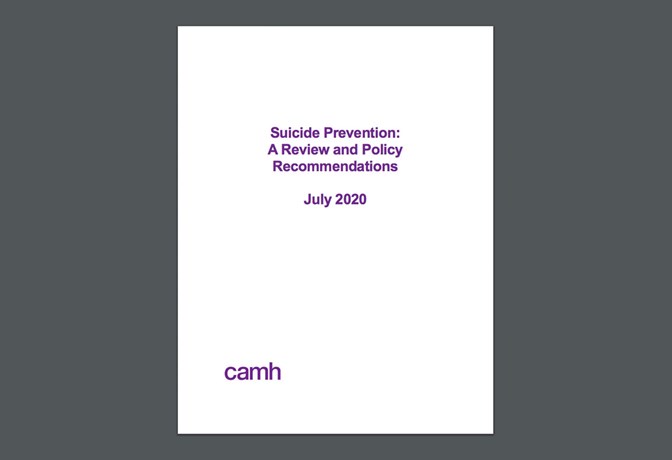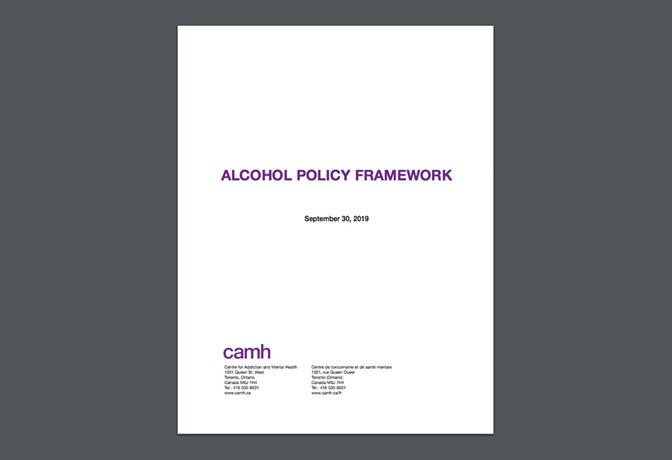[Resource] Influencing Public Policy

Click HERE to view the resource on Influencing Public Policy
CAMH advocates for public policies that are responsive to the needs of people impacted by mental illness and substance use disorders.
CAMH’s new strategic plan re-affirms our commitment to driving positive change at the system level.
We accomplish this by communicating and advocating for evidence-based public policy. Our policy positions are developed in collaboration with a range of experts including scientists, clinicians, educators and people with lived experience.
Suicide Prevention: A Review and Policy Recommendations
Alcohol Policy Framework
What's new:
May 2023
Potential amendments to the Cannabis Regulations: submission to Health Canada
Health Canada recently concluded a consultation on potential amendments to federal cannabis regulations. Among the questions in the consultation was whether Health Canada should consider amending packaging requirements for dried and fresh cannabis. In this submission, CAMH outlines why the packaging and labelling elements of the cannabis regulations – particularly the restrictions on logos, and branding, the mandatory health and product information, and the prescribed formats for information on labels – are necessary to achieve the Cannabis Act’s public health and public safety objectives.
The Alcohol and Gaming Commission of Ontario (AGCO) is proposing to place limits on athlete and celebrity participation in advertising for online gambling. In this submission, CAMH offers support for AGCO’s draft regulations and offers additional recommendations, including a “whistle-to-whistle” advertising ban that covers all gambling content during sporting event broadcasts.
April 2023
CAMH Aging and Mental Health Policy Framework
The number of older adults with mental illness and/or dementia is increasing in Canada. This will not only have a significant impact on the lives of seniors and their loved ones, but also our health care system. That’s why we must have good public policies that prioritize older adults’ mental health. In this Aging and Mental Health Policy Framework we provide an overview of mental illness and dementia in later life and take a look at the prevention, intervention and treatment options available to mitigate symptoms and improve quality of life. We also look at some challenges experienced by older adults with mental illness and dementia, as well as opportunities for improving seniors’ mental health. We end by offering five principles, with recommendations, for developing comprehensive policy in this area.
March 2023
CAMH Considerations on Operationalizing MAiD for Mental Illness
CAMH has made several public statements outlining our concerns with the federal government’s intention to extend eligibility for MAiD to people whose sole medical condition is mental illness. While there is now a temporary delay to this expanded eligibility, MAiD for mental illness is set to become legal in Canada in March 2024. CAMH has established a working group to make recommendations on the operationalization of MAiD for mental illness. The structure of this working group, the questions it is grappling with, and early thoughts to clarify key clinical issues may provide perspective and insight for other hospitals and organizations undertaking similar decision-making processes.
February 2023
Psychedelics are substances that can cause a range of psychological effects. Some cultures have a long tradition of using psychedelics for spiritual, religious, and healing purposes. They have also been used recreationally. Recently there has been a lot of interest in the potential use of psychedelics as medicine. Research involving psychedelic-assisted therapy has shown promising results for some specific mental health and substance use-related conditions. At the same time, private businesses have been investing billions of dollars in psychedelics, and public conversations about psychedelics often contain unfounded claims and speculation about their potential therapeutic value. It can be difficult to know what to believe, which is why CAMH has created an FAQ.
Open Letter from TAHSN ED physicians
In this open letter, physicians from across TAHSN hospitals encourage Mayor Tory and City Councillors to vote in favour of the recommendations being brought to City Council on February 7, 2023 by the Board of Health that would allocate funding for expanding the number of 24-hour warming locations during the winter months and ensure that these services are low barrier and provide walk-in access.
CAMH statement on government’s proposed delay to MAiD for people with mental illness
On February 2, 2023 the federal government introduced legislation to delay MAiD for people whose sole medical condition is mental illness. CAMH issues the following statement in response:
CAMH welcomes the federal government’s legislation to delay MAiD for people whose sole medical condition is mental illness until March 2024. We have remained steadfast in our concern about the significant lack of consensus on this issue. Before eligibility for MAiD is extended to people whose sole medical condition is mental illness there must be thoughtful and inclusive discussions to develop consensus definitions of irremediableness and separation of MAiD from suicidality, and to develop additional safeguards and practice standards. People with mental illness and their families must be part of these discussions. We also need all governments to urgently invest meaningfully in equitable mental health care and supports for all. CAMH looks forward to continuing to engage in these critically important conversations.
November 2022
Legislative review of the Cannabis Act: Joint submission to Health Canada
The federal government is conducting a review of the Cannabis Act, as required by the legislation. In this joint submission, the Centre for Addiction and Mental Health (CAMH) and the Canadian Institute for Substance Use Research (CISUR) make 11 recommendations to ensure that Canada’s approach to cannabis policy continues to put public health first. In particular, we call on the government to ensure that the harm minimization measures in the Cannabis Act are maintained, protected, and enforced.
September 2022
CAMH Submission to the Ontario Human Rights Commission
The Ontario Human Rights Commission recently conducted a consultation on poverty and systemic discrimination at the intersection of housing and mental health and addiction disabilities. In this submission, CAMH discusses the multiple ways that systemic and intersectional discrimination in social assistance, housing and mental health care create and sustain poverty for people with mental health and addiction disabilities. We also highlight the additional discrimination experienced by people with mental health and addiction disabilities who also have a history of involvement in the criminal justice system.
May 2022
CAMH Submission to Special Committee on MAiD
Medical Assistance in Dying (MAiD) for people whose sole medical condition is mental illness is set to become legal in March 2023. The government recently assigned a Special Joint Committee to complete a required review of MAiD legislation, including the expansion of MAiD to people with mental illness. In this submission to the Committee, several of CAMH physician leaders explain their concerns about extending MAiD eligibility, at this time, to include people whose sole medical condition is mental illness.
April 2022
Regulating the legal cannabis market: How is Canada doing?
The Cannabis Act contains a requirement that the legislation be reviewed three years after it comes into effect in order to assess its impact on public health. That review is expected to begin later in 2022. This CAMH report examines cannabis legislation and regulation across the country to determine the extent to which Canada’s model for legal cannabis is consistent with a public health approach. Overall, we find that Canada’s regulations are optimal in the area of advertising, marketing and promotion; adequate with respect to minimum age as well as tax and price; while some provinces and territories – especially those with private retail systems – have work to do around controlling availability.
February 2022
Housing is a key social determinant of health and a significant component of recovery and wellbeing for people with serious mental illness. Unfortunately, there is a lack of affordable and supportive housing in Canada. CAMH’s Housing and Mental Health Policy Framework 2022 updates our previous work in this area (Housing Policy Framework 2014) to reflect and account for new evidence and recent policy developments. Its purpose is to provide a model for housing and mental health policies that effectively address the needs of people with mental illness, including those with substance use disorders. The Framework offers governments and decision-makers recommendations for developing comprehensive housing and mental health policy and provides six high-level principles as guidance.
September 2021
Statement on the decriminalization of substance use
CAMH has long supported a public health approach to substance use. There is broad support for decriminalization in Canada, but this model can take many forms. With this statement, we aim to support policymakers as they consider changes to Canada's drug policies. (Also available in French
).
July 2021
Alcohol deregulation: Submission to the Ministry of Finance
In this submission, CAMH responds to a consultation about proposed regulations under the Liquor Licence and Control Act. We make the point that problems arise when applying a business lens to alcohol sales. Measures that may seem reasonable from a business perspective are not necessarily appropriate for a product that comes with inherent health risks.
November 2020
Presentation to the Standing Committee on Justice and Human Rights On Bill C-7
Bill C-7 proposes several amendments to Canada’s Medical Assistance in Dying (MAiD) legislation, including a temporary prohibition on MAiD for people whose sole medical condition is mental illness. In this presentation to the Standing Committee on Justice and Human Rights, Dr. Tarek Rajji explains why CAMH supports this temporary prohibition.
October 2020
Mental Health and Criminal Justice Policy Framework
This document updates CAMH’s 2013 Mental Health and Criminal Justice Policy Framework to reflect and account for new evidence and recent policy developments. Its purpose is to provide a model for mental health and criminal justice policies that effectively address the criminalization of mental illness and to inform federal and provincial initiatives in this area.
Supervised consumption sites and services: Submission to Health Canada
Opioid overdose deaths have been on the rise across Canada since the COVID-19 pandemic began. Along with prevention and treatment, harm reduction plays a critical role in decreasing the impact of drug-related harms. This submission, which is a response to a Health Canada consultation, makes recommendations towards enhancing access to supervised consumption sites and expanding the types of services they offer.
July 2020
Suicide Prevention: A Review and Policy Recommendations
Suicide is a tragic and complex public health problem that impacts individuals, families and communities. Across the globe, almost 800,000 people die by suicide every year, or about 1 person every 40 seconds. In this paper, we highlight suicide-related statistics for Canada, provide an overview of risk factors and warning signs, and discuss a range of suicide prevention strategies that are known to work or that show promise of future success. We offer five recommendations to governments and decision-makers on how to advance suicide prevention efforts in Canada.
Submission to the Toronto Police Services Board Virtual Town Hall
When people with mental illness experience a crisis in the community and are not able to get the mental health care that they need the results can be tragic. This injustice is compounded by racism – particularly anti-Black and anti-Indigenous racism. The system of crisis response as it exists today does not work. People experiencing a mental health crisis need health care. In this submission to the Toronto Police Services Board Virtual Town Hall, Dr. Catherine Zahn, CAMH’s President & CEO, calls for a new direction in crisis care.
Mental Health in Canada: COVID-19 and Beyond - CAMH Policy Advice
COVID-19 is both magnifying and contributing to Canada’s mental health crisis. The health, economic and social consequences of the pandemic are taking their toll on the mental health of the population, with some groups at greater risk of developing more severe difficulties. Governments at all levels have recognized the negative impact that COVID-19 can have on mental health and are ensuring that resources, supports and care are available. But more is needed. In this paper, CAMH looks at the mental health impact of COVID-19 on Canadians and makes 5 recommendations to governments and decision-makers on how to support Canadians’ mental health during COVID-19 and beyond.
January 2020
The Government of Canada has committed to changing federal Medical Assistance in Dying (MAiD) legislation by March 11, 2020, making MAiD for people with non-terminal illnesses, including people with mental illness as their only medical condition, an imminent reality. In this submission to the Department of Justice, CAMH reiterates our reservations about this decision, but accepts that it is the way forward. We make two recommendations to government on how to address this complex moral and ethical issue.
December 2019
Regulating the sale of vaping products: Letter to the Toronto Board of Health
In this letter, CAMH endorses the recommendations of the Medical Officer of Health with respect to the regulation of e-cigarettes and related products.
September 2019
CAMH Alcohol Policy Framework update
This document updates CAMH’s 2013 Alcohol Policy Framework to reflect and account for new evidence and recent policy developments. Its purpose is to recommend policies and regulation that effectively address the health and social harms that often accompany alcohol use and to inform provincial and local initiatives in this area. (Cliquez ici
pour la version française.)
April 2019
Proposed changes to alcohol availability in Ontario: CAMH commentary
In this statement, Dr. Jürgen Rehm and Dr. Samantha Wells explain why alcohol “choice and convenience” comes at the expense of public health and safety.
February 2019
Closed Quarters - Housing and Justice paper
People with mental illness who are involved in the criminal justice system frequently experience precarious housing and/or homelessness. In Closed Quarters, CAMH along with our partners, the Wellesley Institute, John Howard Society – Ontario and Canadian Mental Health Association – Ontario look at the issues faced by people who needs intersect and overlap the housing, mental health and justice sectors in Ontario. Based on the research evidence and consultations across sectors, the report offers three recommendations to government.
Check the directory below for a full list of documents:
-
By
CAMH
-
Published
Jul 26, 2023
-
Subject Area
-
Audience
- Academics
- Service Providers (Non-profits, Community Organizations, Local government)
-
Category
- Policy, Planning, & Procedures
Newsletter
Sign up for the Healthy Aging CORE BC e-news to keep up-to-date with activity from the platform and the Community-Based Seniors Services (CBSS) sector across the country.


